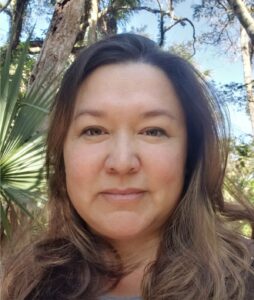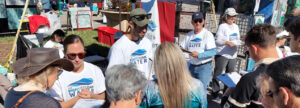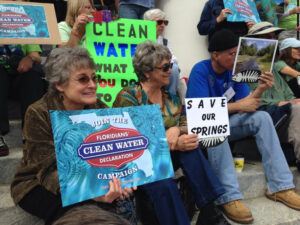Organizer says it’ll take ‘a miracle’ to reach 900,000 signatures. But the effort still moves forward.
By Reece Helmick
Original Air Date: July 4, 2025
Host: The Florida Right to Clean Water campaign is in Round 2 of trying to get the right to clean rivers, lakes, bayous and bays enshrined in the Florida constitution. After it failed two years ago to reach the 900,000 signatures state law requires to put amendments on the ballot, the volunteer-driven organization revived its effort last year, aiming for the 2026 election. But in June, the Fort Myers-based campaign suspended signature gathering in response to new state restrictions. The organizers now say it will take a miracle to reach the 900,000 threshold. Reece Helmick reports.
Reece Helmick: The Florida Right to Clean Water campaign has been trying to empower Floridians to hold their state government accountable for the basic right to clean water. Melissa Martin is the campaign coordinator, and she is passionate about her job.

Melissa Martin
Melissa Martin: It doesn’t need to be said, but clean water is an “everything, everyone” issue from recreation to drinking water supplies to all the above.
RH: Martin believes a legal correction needs to be made. She presumed that the state government would do the right thing when it comes to clean water, but that was not the case. That is what originally led her to advocate for the constitutional amendment. But now, powerful special interests of the state government seem to get in the way of the Clean Water campaign, she says, with the state government now obstructing any headway on her—and all—citizen-initiated amendments, for that matter.
The Florida Legislature passed HB 1205 on May 2, and Governor Ron DeSantis—who made this one of his priorities this year—signed it into law, effective on July 1. The law imposes new restrictions on citizen-led petitions which include stricter requirements for petition circulators, shortened deadlines and increased fines for violations.

Florida Right to Clean Water petitioners gather signatures.
In order for petition forms to be approved, organizations such as the Clean Water campaign now must provide affidavits to the Secretary of State. The affidavit must include name, address, date of birth, drivers license number and/or ID card number of each circulator and the last four digits of the petitioner’s social security number.
According to Martin, all this has scared away volunteers.
MM: They are required to register with the state, first of all, and subject themselves to incredible potential civil and criminal liability, but those liabilities are also attached to parts of the law that are vague and uncertain right now. No one is sure what the law means for various requirements, so no one reasonable is going to put their name down and say, “Yes you can sue me for something I don’t know what’s wrong or right.”

Photo via Sierra Club
RH: Also in effect is now a 10-day rule. Under this new rule, the Clean Water campaign now has only 10 days to get signed petitions to each county Supervisor of Election. Martin’s campaign is heavily reliant on U.S. Mail, which can take up to 5 business days to get mail delivered. All of the mailed signed petitions are sent to the campaign’s headquarters in Fort Myers and then mailed back to each county Supervisor of Election where it originated. Every day petitions arrive after the 10-day limit costs the campaign a $50 fee, which Martin says would deplete the campaign’s bank account rapidly.
The signatures they already have are valid until February 1, 2026 if the campaign didn’t qualify for a ballot. According to Martin, it would take nothing short of a miracle to reach the 900,000 signatures threshold. While Martin says Florida Right to Clean Water is unsure if signatures will continue, she remains optimistic.
MM: I’m not going to throw out the last hope. For many of us, this is our baby. This is so important to Florida and life in general in Florida, so this is something we have to go forward with no matter what.
RH: Reece Helmick, reporting for WSLR News.
WSLR News aims to keep the local community informed with our 1/2 hour local news show, quarterly newspaper and social media feeds. The local news broadcast airs on Wednesdays and Fridays at 6pm.